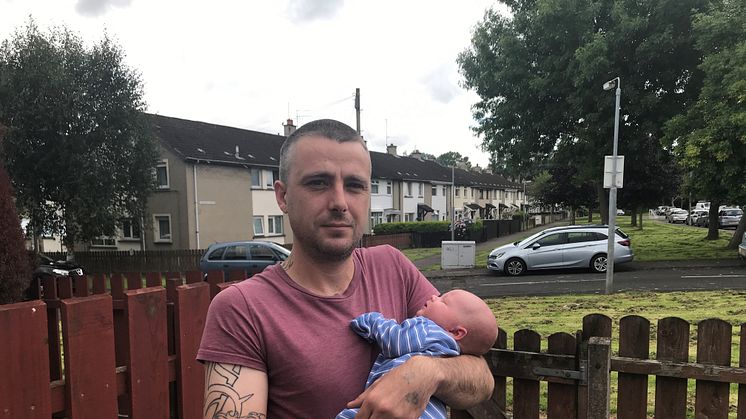
Press release -
Nearly half of working age stroke survivors face financial hardship
The Stroke Association’s Lived Experience report is the UK’s largest ever survey of people affected by stroke(i) with over 11,000 responses. The second chapter (of four), The wider impact of stroke, shows how the impact of the condition affects people’s working life, relationships and finances.
There are currently over 1.2 million stroke survivors in the UK, with a quarter of strokes happening to people of working age. The findings show the price tag that can come with a stroke, revealing that across the UK;
- Over half (51%) of stroke survivors aged under 65 gave up work or reduced their working hours following their stroke.
- Close to one in six (15%) of stroke survivors aged under 65 experienced discrimination, or missed out on a promotion, or said their employer was not supportive.
Connor Shevlin is 32 and lives in Dunmurry, Belfast.
Connor had a stroke in June 2019. He remembers waking up one morning feeling extremely dizzy and was unable to walk. He was also experiencing problems with his vision. After a day, when his condition hadn’t improved, he phoned an ambulance which took him to the Royal Victoria Hospital in Belfast.
Following a brain scan, doctors confirmed that Connor had had a stroke.
Connor spent a week in hospital and says: “The left side of my body is numb and my right side doesn’t seem to work properly at the moment but I’m working on that”.
Connor is still experiencing problems with walking and his vision and also has weakness in his arms when tired.
Two days after he got out of hospital, his partner Louise gave birth to their fourth son, Aidan.
Connor says: “I just had to get myself out so I could be with Louise. I had to be there for her”.
Before his stroke, Connor had a seasonal job in a local coal yard and was about to start working there full-time.
Connor says: “It’s hard physical work. We move and stack coal all day long. Well I obviously can’t do that now and I don’t know if or when I’ll be fit enough to go back to work”.
Recently, Connor had been developing a talent for performance production and had taken some work as a production engineer. He’d recently worked on sound and lighting for the Belfast International Tattoo.
Connor has been trying to apply for Employment Support Allowance or (ESA) but has found this process frustrating. He says: “I don’t know much about the benefits system and what you have to do. I’ve never claimed sickness benefit before. Now I really need some help and it’s just so hard to get anything sorted out. I don’t think they understand that, right now, getting up in the morning and getting all that stuff done is hard enough. I can’t even go out by myself at the moment.
“I’ve worked most of my life and now, with our new baby and everything, I need to get to work. We need to bring in some money. Right now, I don’t know what’s going to happen.
“I said to my physiotherapist that I needed to get fit again and get a job. She told me that I would not be ready for that for months yet. I just couldn’t believe it.
“As well as all the work and money worries, it upsets me to think I can’t just kick a football about with the kids or run after them as normal.
“I don’t know what I’d have done without the support of my family and my partner Louise through these last few weeks. Though when I was in hospital it struck me just how lucky I’d been. There were people in my stroke ward who were affected so much more than me. I do think a lot about how it could have been so much worse and how I could’ve been a different person. I might not have been able to speak to you now.
“I know it’ll get better but I’m beginning to realise that recovery is going to take a lot longer than I thought at first”.
Barry Macaulay, Director of the Stroke Association in Northern Ireland, said: “Life changes instantly after a stroke, and the condition can have a huge cost, not only to people’s finances, but also to their health, independence and relationships. But not enough people realise the wider impacts that stroke can bring. Overnight, a partner becomes a carer. A breadwinner becomes jobless.
“These latest figures show that many stroke survivors are facing a life on the edge of poverty; many have had to give up work, and in some cases, face discrimination from their employers. This comes at a time when financial worries should be the last thing on their minds.”
The Lived Experience of Stroke report seeks to expose the realities of living with stroke. The charity wants everyone affected by stroke to have access to the support that they need, when they need it. The latest findings also show that:
- Nearly one in five (15%) of stroke survivors faced increased costs as a result of their stroke, which could include medication, aids and higher household bills due to being at home
- Sometimes stroke survivors even have to sell their homes to pay for medical expenses; across the whole UK stroke population this could be as many as 12,000people.
- Only one in 10 (10%) of stroke survivors had used a benefits or financial advice service.
Barry continues: “Recovery is tough, but with the right support and plenty of courage and determination, the brain can adapt. Time and again we’ve seen thousands of people like Connor, adapt to a new life after stroke; and we’ve helped them to adjust to a new normal. However, it is extremely worrying that not enough stroke survivors are receiving the support they need to either remain in work or access vital benefits. I’d like to see more people contacting our Helpline to help them through this difficult process.”
The Stroke Association spoke to stroke survivors, who offered advice for anyone who has found their work or finances impacted by their stroke. They advised:
Before stroke happens, consider income protection insurance and critical illness cover. For those who have dependents, such as a partner or children, you might also consider life insurance.
- When returning to work, talk to your employer and agree reasonable adjustments to help you in the work place. This could be a phased return, part-time or adjusted hours, or a move to lighter duties.
- If you are an employer and an employee has had a stroke, learn about the condition to help you understand how it affects an individual. Ask your employee what they need as this will enable you to support them in the best way.
- A stroke can have a huge financial impact, stroke survivors need signposting to services or charities that offer financial support.
Don’t be afraid to seek help – whether you are a stroke survivor or you know someone who has had a stroke.
Angela Matthews, Head of Policy & Advice at the Business Disability Forum, said: “Soon after a stroke, a survivor has to navigate how different their body feels, the changed pace at which their body needs to work, and learn to adjust to doing things in new ways. All of this often happens in the background while needing to return to work so that personal finances are affected as little as possible. Stroke survivors might not be able to return to the same job they did before, but they can sometimes return to some type of work, albeit different to what they used to do.
“The worrying 51 per cent who have given up work following a stroke means employers are losing valuable, experienced talent. There is also the wider policy concern that the disability employment gap is being increased, when stroke survivors are not being supported back to work by both the healthcare and workplace settings working together.”
The Wider Impact of Stroke report is part two of a four part series focusing on the Lived Experience of Stroke. For more information about the Lived Experience of Stroke – Wider Impact report, visit www.stroke.org.uk/livedexperience.
The Stroke Helpline (0303 3033 100) offers information and support to people who have been affected by stroke.
- -Ends-
Topics
Categories
- Stroke strikes every five minutes in the UK and it changes lives in an instant.
- The Stroke Association is a charity working across the UK to support people to rebuild their lives after stroke. We believe that everyone deserves to live the best life they can after stroke. From local support services and groups, to online information and support, anyone affected by stroke can visit stroke.org.uk or call our dedicated Stroke Helpline on 0303 3033 100 to find out about support available locally.
- Our specialist support, research and campaigning are only possible with the courage and determination of the stroke community and the generosity of our supporters. With more donations and support, we can help rebuild even more lives.
- You can follow us on Twitter, Facebook and Instagram.










